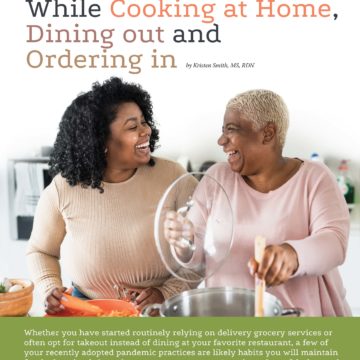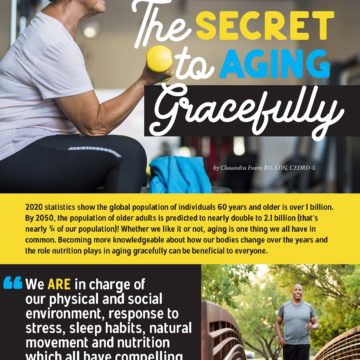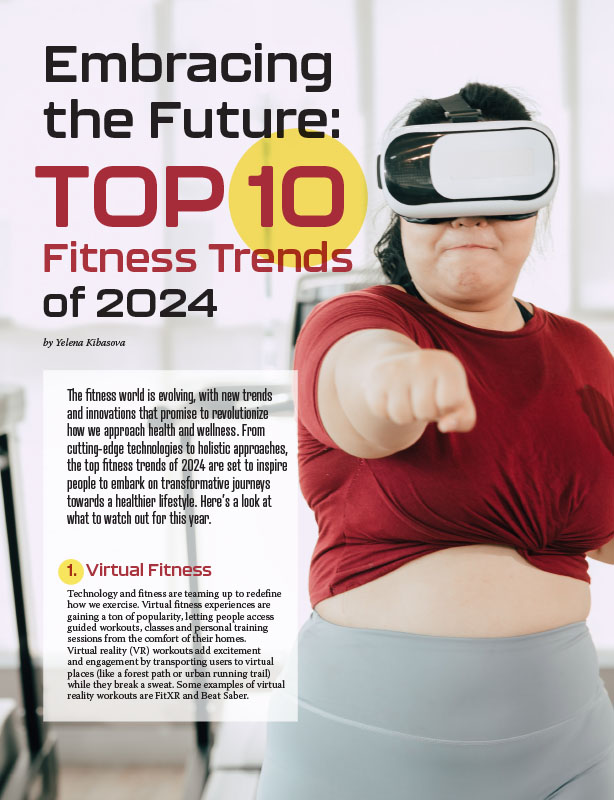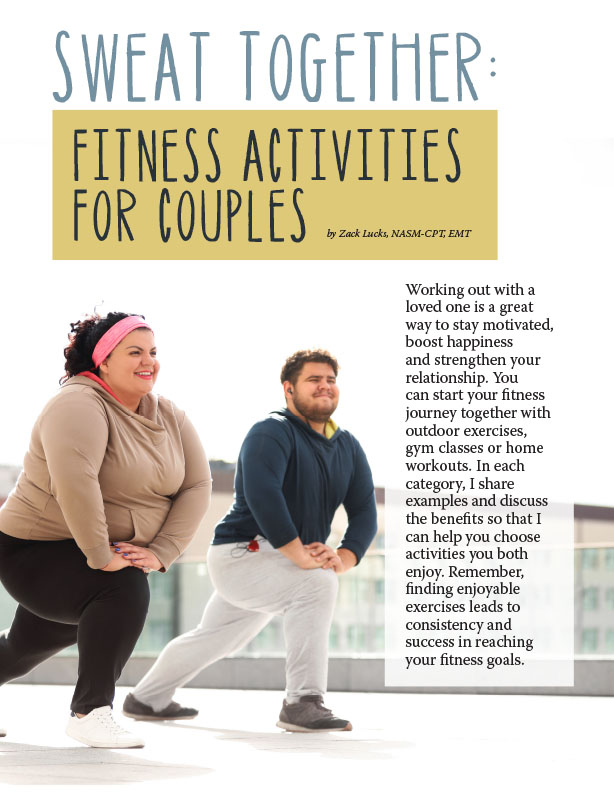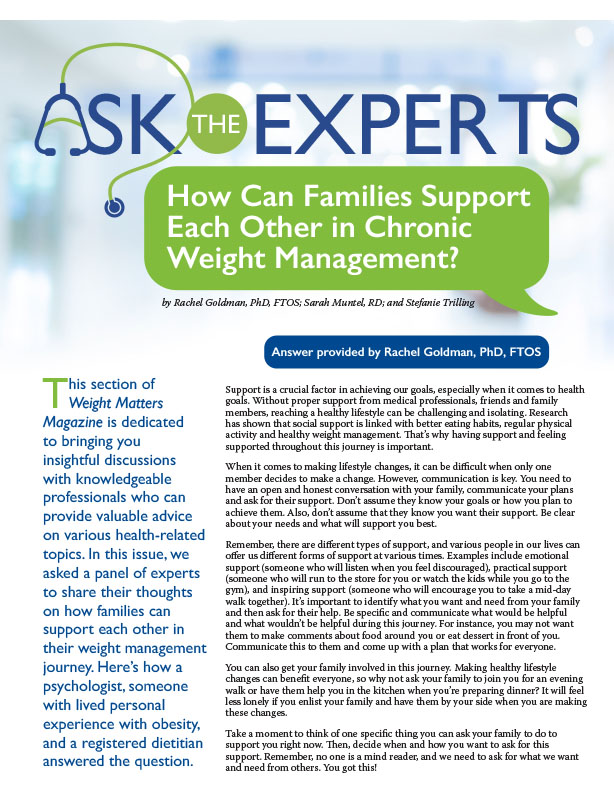How to Filter through the Fads and Gimmicks of Nutrition and Exercise

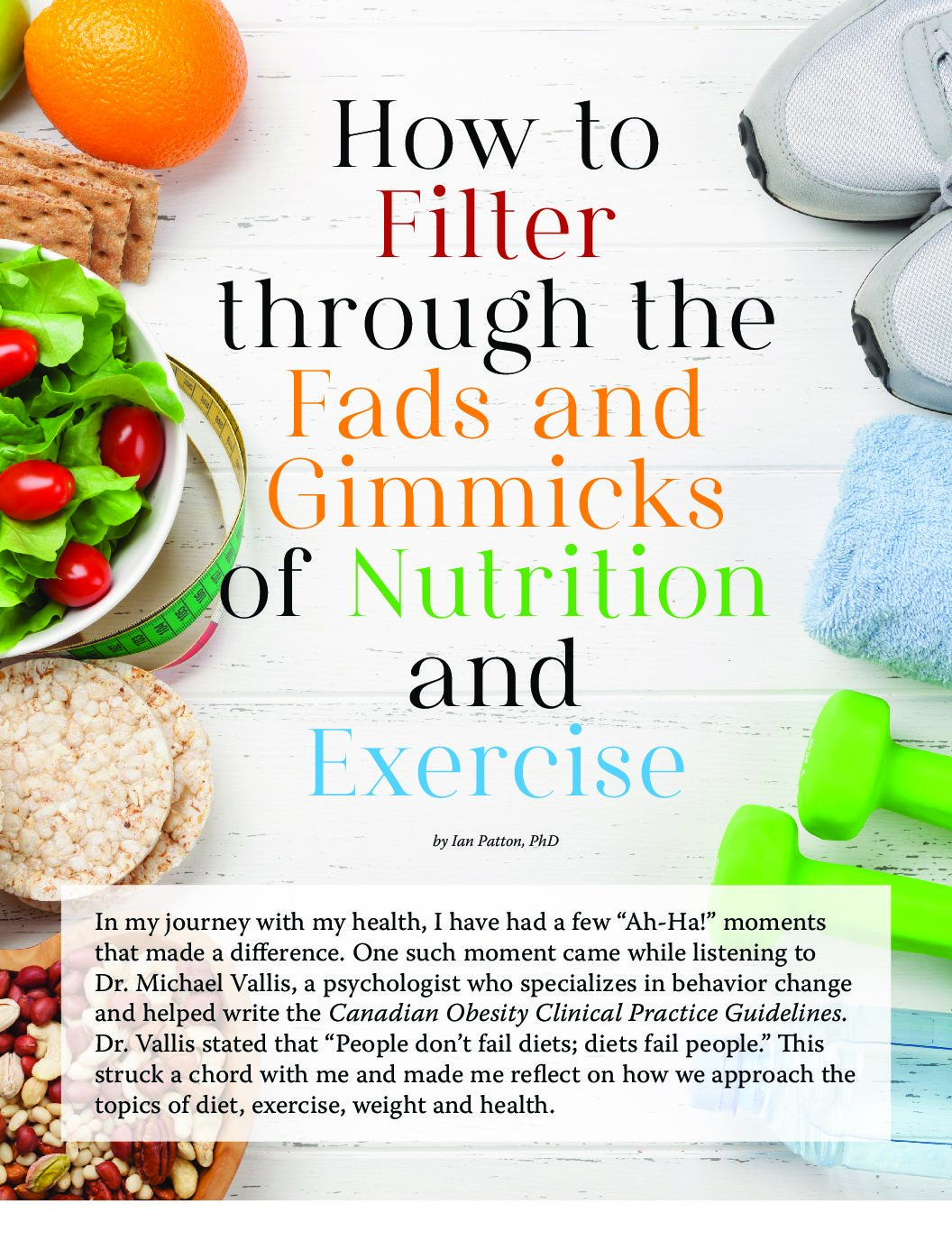
by Ian Patton, PhD
Spring 2022
In my journey with my health, I have had a few “Ah-Ha!” moments that made a difference. One such moment came while listening to Dr. Michael Vallis, a psychologist who specializes in behavior change and helped write the Canadian Obesity Clinical Practice Guidelines. Dr. Vallis stated that “People don’t fail diets; diets fail people.” This struck a chord with me and made me reflect on how we approach the topics of diet, exercise, weight and health.
The multi-billion-dollar diet and exercise industry bombards us with news and headlines selling us “what we need to be healthy” and the newest “miracle solution.” Many of these messages are conflicting. Apparently, based on my social media timeline, if everyone was simply a vegan, doing the Keto diet or doing intermittent fasting, all the world’s problems would be solved. If that doesn’t work, there is certainly a juice cleanse or herbal supplement to jumpstart my metabolism. The question is, who do we listen to?
Diet and Exercise Can’t Always Control Obesity
I think first we need to understand that obesity is a complex chronic disease. Some elements are outside of our control. Factors like genetics, hormones and biology are not addressed with dieting and exercising, no matter how much willpower you have. We also have to understand that while personal behaviors are important for health and wellbeing, they are not in and of themselves a cure for a chronic disease.
So, while we can confidently say that everyone could benefit from eating better and exercising, we need to reconsider WHY we are changing these behaviors. Even more important is to understand WHAT is a valid measurement of success when it comes to these behaviors because it sure isn’t weight.
We need to take a step back to recognize the bigger picture and reflect on our own situations, goals and interests before we decide on making a change.
Filtering through the Fads and Gimmicks
When I was young, I remember being told, “You can’t believe everything you see on TV.” Now we have to update that saying to include the internet and social media, but the sentiment is the same. While there is no easy answer, here are some pointers that can help:
- Always be curious – Open yourself to learning new things and listen with an open mind.
- Be skeptical – If it sounds too good to be true, it probably is.
- Consider the source –
Who is telling you this information?
What are their qualifications to do so?
Are they trying to sell you something?
If so, can they support their claims to justify you spending your hard-earned money?
- Go beyond the headlines – Today’s society is all about the rapid consumption of micro-information. When it comes to health, years of research are often reduced down to headlines that get picked up. We see a hot issue headline and share it without reading the context. We don’t know how the authors came to their conclusions or the quality of the information. Dig a bit deeper and see if the story matches the flashy headline.
- Look for leaders – By leaders, I don’t mean the loudest person, but rather the people and organizations doing the research the work in the field. If it is good information, the leaders will likely have something to say about it.
- Don’t add to the problem – If you find something that works for you, amazing! Enjoy it, share your experience with people who ask, if you want, but do not go about assuming that because it worked for you, it’s the right way for all others.
Why Do People Fall for Fads and Gimmicks?
I teach two courses at a University that focus on health, physical activity and human development. One of the concepts we discuss in my class is the idea of health literacy. Health literacy is an individual’s ability to seek out, understand and utilize health information. We live in a world that is more connected now than ever before, we have access to more information now than ever before, and this information is presented in very short, consumable pieces that fit our fast-paced lives. The problem is that a lot of this information is normally littered with misinformation.
Nowhere is this more prominent than in the area of diet, exercise and weight-loss. It seems everyone and their cousin has become a certified expert in these topics. From news stories and celebrities to our family members and co-workers, everyone seems to have important health advice for you. The problem is, how do we decide what is credible and worthy of adopting, and what should be ignored as misinformation? With the sheer volume of messages we are exposed to on these topics, it is not an easy task.
If you are like me, someone who has lived with obesity for most of my life, you might be a bit more susceptible to this flood of misinformation and more willing to buy into some of the fads and gimmicks. I know I sure did. I tried every fad diet you can think of – all sorts of extreme exercising, supplements, apps, books, everything!
I had something wrong with me and society made it clear that it was my fault. I wouldn’t fit in, be successful or be happy until I did something about it.
The fact that evidence-based, effective obesity treatments are not widely accessible and we are left to fend for ourselves pushes more people towards the fads and gimmicks. When living with obesity, it can be appealing to look for a “quick fix” to a disease that can’t be fixed quickly in most cases. It can be difficult to stick with a plan for months on end.
So, after a period of “falling off the wagon,” we try again and double down or move on to the next fad. I don’t know about you, but the more I tried and failed, the longer I spent “off the wagon.” This also meant when I did try again, I was further from my goals than I was last time, and the vicious cycle continued.
How Can I Live a Healthier Life?
Now that you have invested time into reading this article, and you understand the big messy swamp of information we have to swim in, I want to give you two very simple rules to live a healthier life when it comes to diet and exercise:
- Eat as Healthy as You Happily Can
Outside of the knowledge that we should try to limit ultra-processed foods and eat more whole foods, remember there is no one best diet. Find a pattern of eating that you enjoy and can see yourself doing long-term.
Healthy eating can be made easy when it seems and looks less threatening. You can start small by adding in an extra vegetable every day, then maybe adding in an extra fruit and vegetable the next. If you are unhappy with your diet, it will never work long-term.
- Move Your Body for Health and Enjoyment. Weight-loss is Just a Bonus!
As a Kinesiologist, I will tell you that being active is probably the single most important thing you can do for your health, but weight-loss should never be the goal of the activity. There is a misconception that we have to suffer in order to reap the health benefits of exercise. The more we suffer, the healthier we will be. This is not true! Small increments of light activity can have a big impact.
If you’ve never stepped foot in a gym, or you’ve been inactive for years, any movement is good. That might mean going for a brisk 30-minute walk or moving your body while seated in a chair for five minutes at a time. Whatever your starting point is, being active is possible. You don’t need to join a 6:00 AM class every Tuesday, purchase a gym membership or run marathons to be healthy (unless of course, you enjoy doing those things).
Just like nutrition, physical activity needs to be something you enjoy doing long-term or else it will not last. Try new things, join classes, get outdoors and simply move your body a little bit more than you did yesterday. You will be surprised how quickly it adds up.
Bypassing the Fads and Gimmicks
While it can be easy to get caught up in fad diets or exercise gimmicks, it’s important to remember that just because a celebrity on TV is telling you it’s going to work doesn’t mean that it will. Being happy and healthy can go hand in hand if you just allow yourself some time to figure out what works best for you.
About the Author:
Ian Patton, PhD, is the Director of Advocacy and Public Engagement for Obesity Canada. By combining his academic training in Kinesiology with his own lived experience with obesity, Ian has been an active patient advocate in Canada as well as internationally. He is passionate about eliminating weight bias and discrimination and improving obesity care for all.
by Yelena Kibasova Spring 2024 The fitness world is evolving, with new trends and innovations that promise…
Read Articleby Zack Lucks, NASM-CPT, EMT Winter 2024 Working out with a loved one is a great way…
Read Articleby Rachel Goldman, PhD, FTOS; Sarah Muntel, RD; and Stefanie Trilling Winter 2024 This section of Weight…
Read Article




